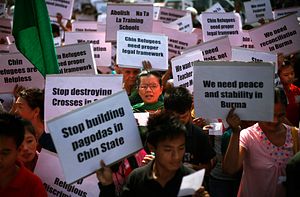“Going back is not an option — if I do, I will be arrested, tortured, and killed,” says 36-year-old Chung Dawi. Dawi, who is currently living in India, comes from an ethnic Christian community called the Chins and is originally from Myanmar.
The Chins, much like the Rohingyas, a largely Muslim ethnic group, have faced brutal abuse and discrimination at the hands of Burmese military. Both groups have been a victim of ethnic cleansing carried on in Myanmar where the communities are persecuted for their cultural and religious beliefs being different from the majority Buddhist population.
Under such circumstances, a large number of Chins fled Myanmar, mainly to neighboring countries like Thailand, Malaysia, Bangladesh — and India. Dawi explains how he arrived: “The access to India is easier for us — Mizoram’s border lies just 50 kilometers from the Chin state. So it [India] becomes our safest bet to ensure survival.”
In India, the Chin community is concentrated in areas of West Delhi like Chanakya Place, Sitapuri, Bodella, and Altaspur.
The Chins started their migration around 1998 when their movement for self-determination in their home country failed and the military crackdown intensified. They started to flee and many are presently living the uncertain life of asylum seekers and refugees in foreign countries.
But for the Chins who chose India as their choice of new home the situation is not altogether very rosy. “We are guaranteed safety here, for India is a democratic country. But we cannot lose our refugee tags and assimilate with the population,” says Dawi. “Despite spending over 10 years here, I still am treated like a foreigner.”
Incidents of discrimination here in India are also prevalent — people call the Chins “Nepali” and “Chinki” in a derogatory manner.
India is not a signatory to the United Nations Refugee Conventions. Because of this it is not bound by any law to assimilate refugees within its population. India still does so on humanitarian grounds. A refugee in India gets to stay only on the basis of a “Refugee Card” granted by the United Nations High Commissioner for Refugees (UNHCR). Recently, the UNHCR was planning to revoke those cards for Chins, saying the situation in Myanmar was now “stable and secure.” Under such an eventuality, the Chins will have no other option but to go back to Myanmar, or move to some other country and start their life afresh.
“Going back is not an option for us Chins as the situation is very bad there. It is not safe for us. We live in constant insecurity. If UNHCR withdraws the refugee status we will be left without a country to go to,” says Chung Pi, 30, who has been living in India for the past 15 years.
The Chins hence largely see India as a temporary pit stop. Their quest for a home continues and they are now placing their hopes in what they call “third countries:” Canada, the United States, and Australia. These countries have more liberal and inclusive laws with regard to refugees.
“In India, we cannot find proper work in the organized sector because of no documentation. We cannot get our children admitted in schools as they will treat us as foreigners and charge exorbitant fees from us. How can we afford that?” says Chung Pi.
The “third countries,” however, promise asylum seekers and refugees free education and proper assimilation programs with the local populace, all part of a resettlement sponsorship program run by the third countries with the support of the UNHCR. If even one person from the Chin community gets settled in a third country, he or she can nominate others to come later. This way a whole family can dream of starting a new home in a foreign land.
Chung Pi, whose wife’s brothers are settled in Australia, is hoping to join them there. “For the safety of my daughter and son, for their future, I am trying to sign my family up for sponsorship program in Australia,” he says. “There I will be able to construct a safe home for me and my family.”
But for now, for Chung Pi, and many Chins, the dream of a safe, secure homeland remains just that – a dream.
Sania Ashraf is a multimedia journalist currently pursuing a post-graduate course in journalism from AJK MCRC, Jamia Millia Islamia, New Delhi.

































